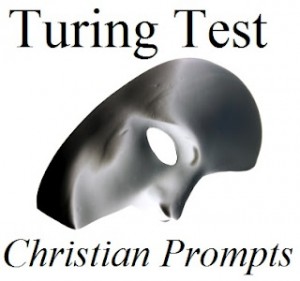This is the eighth entry in the Christian round of the 2012 Ideological Turing Test for Religion. In this round, the honest answers of Christians are mixed in with atheists’ best efforts to talk like Christians. It’s your job to see if you can spot the difference. The voting link appears at the end of the entry, and you can look at all entries in this round here.
When (if ever) have you deferred to your philosophical or theological system over your intuitions?
Although I don’t agree with everything the Catholic Church preaches, especially its stance against equal rights for homosexuals, I do find myself deferring to Catholic doctrine in some circumstances even though I can sympathize with opposing views. I would never judge someone for using birth control in order to be safe, or to turn to medical practices such as artificial insemination in order to successfully conceive, but for my own actions I hold to Catholic teachings. Although it can sometimes be difficult, I trust and agree with the Church that they encourage the healthiest course of action, physically, mentally, and emotionally. For example, I am strongly against abortion as a form of retroactive contraception but I believe it’s permissible when the mother’s medical safety is in danger. However, there are a number of situations where I’m conflicted. This includes instances of rape, as a consequence of important medical research, or of an honest attempt by a mother to conceive via in vitro fertilization. In all of these cases my intuition runs toward sympathy with the mother and those in medical need, but I feel I must defer to Church doctrine as my conflicted feelings are not sufficient to overturn such teachings when a life is in question.
Are there people whose opinions on morality you trust more than your own? How do you recognize them? How is trusting them different than trusting someone’s opinion on physics?
It can be difficult to find persons of distinguished moral character as all humans are prone to error, however, I do believe people of great moral integrity can be recognized in daily life. When presented with an unfamiliar pastor or other moral authority, I think it’s important not to simply accept their teachings without question. When I think of those who have influenced me most in terms of morality, I remember those who were inclusive, not exclusive, and erred toward showing compassion to others. I’m turned off by inflexibility, from both believers and unbelievers. I also admire those who exemplify all of the moral teachings of Jesus and not only those regarding hot political topics. I find it very disagreeable when supposed Christians use scripture as an excuse to judge others but are uncharitable or uncompassionate themselves. Not all of the people I admire morally are Catholic, or even Christian, but are consistent with scripture’s moral teachings in how they live their lives. Appreciating someone’s opinion on morality is different from their opinion on physics or mathematics because it’s not about objective arguments or formulas, but about recognizing when they live their life as an example you can follow.
Can you name any works of art (interpreted pretty broadly: books, music, plays, poetry, mathematical proofs, etc) which really capture the way you see life/fill you with a sense of awe and wonder? You can give a short explanation or just list a few pieces.
I enjoy reading a lot of different fiction and think that many modern stories being told today are morality parables that have roots in (or at least parallels with) religious teachings. I think it’s important that these stories are told because they allow people to explore their feelings as well as the perspectives of others. Stories like Buffy the Vampire Slayer and Harry Potter may not be very formal, but they explore moral and philosophical concepts in a way that the average person finds accessible. I also enjoy comedies, such as Modern Family and How I Met Your Mother. I think that humor and laughter is very important to spiritual health. I don’t like anything needlessly violent or gory, which I find degrading. When it comes to religious art, I find myself most responding to music, especially Christmas music. Growing up, we were blessed to have a very talented group of musicians at our home parish, including a full bell choir during Christmas time that would always leave me with a sense of awe. During the Christmas season I play Christmas music constantly and never really get sick of it. It reminds me of family and home and hope.
Click here to judge this entry, and, once you’ve voted, feel free to speculate and trade theories in the comments or look at other entries in this round.
















